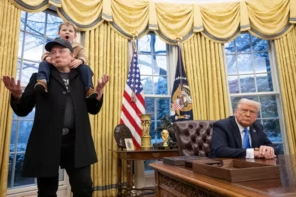On August 16, US President Donald Trump disbanded his pair of business councils: the American Manufacturing Council and the Strategy and Policy Forum. This he did amid a decisive outflow of members to these commissions, as his recent actions have alienated executives on moral and business grounds. As Trump’s approval ratings fall, he has shifted his focus to firming up the conservative populist base that ultimately carried him to the White House. But these ever-more controversial positions have built a wall—”a great wall, a beautiful wall”—between himself and the business community he prizes so much and whose approval he craves.
Kicking off this outflow was an individual who has since drawn public contempt himself. Uber CEO Travis Kalanick resigned from the Strategy and Policy Forum in February in protest to the President’s executive order on immigration. At the time, he was a lone wolf. And with all of the controversy that has surrounded Kalanick after the fact with regard to corporate culture at Uber, his departure would have been soon dismissed by the public.
However, on June 1, Tesla CEO Elon Musk and Disney head Bob Iger resigned in protest to President Trump’s withdrawal from the Paris Climate Agreement. Musk’s departure was self-evident; the CEO of the world’s most notable electric car company has a vested interest in promoting climate change response—regardless of his moral leanings. Iger’s motives were less clear, but ultimately, his withdrawal didn’t rock the boat.
It was Charlottesville that served as the catalyst for the events of recent days. From August 14 to 16, ten members of the American Manufacturing Council stepped away from their seats at the President’s table. This they did not because of the events in Virginia, but due to Trump’s response and rhetoric after the fact. His steadfast objection to condemning the alt-right—who loyally supported his election—was ultimately too objectionable for these companies to be seen as implicitly supporting.
Business leaders can only hope they haven’t lost their seat at the adults’ table—even if it seems to be run by an overgrown child.
In this case, one might be led to wonder why the CEOs signed up to participate in these councils in the first place. It has never been much of a secret that Trump’s conservative populism is outside the realm of what is generally understood to be “politically correct”. Why would these CEOs, especially the ones who appeal to broad markets of consumers (think Under Armour and Campbell Soup), ever want to take the risk of associating with the president who referred to the 11.7 million Mexican immigrants residing in the US as “rapists and murderers”? The answer is that to the greater business community, sitting at the table with the President is not typically seen as an endorsement. Rather, it is seen as an opportunity to promote the company’s interests, and to drive policy, strategy, and rhetoric toward their corporate goals. In fact, to turn down an offer to sit on the President’s business councils would be a betrayal of their stakeholders, even those vilified by the current administration.
However, it has become apparent to these business leaders that they will have no true impact on the administration, and that their continued involvement is unpopular among consumers. I would venture to guess that leaders like Michael Dell and Walmart head Doug McMillon might soon be faced by a public that sees their persistence on the business councils as an endorsement of the President’s positions.
The embarrassment that surrounded this outflow of support from business leaders caused Trump to cut his losses and disband the councils entirely. What this means for the Trump presidency remains to be seen. It’s no secret that Trump prided himself on the support he received from some of these business leaders. He likes to see himself as one of them. There’s little doubt that their disbanding will be a blow to his pride and to his legitimacy as a friend of business. And with such a hot-headed President, that is no small matter. However, this also changes the landscape for policy going forward.
We can only hope that the interests of American businesses continue to be represented, and not just by the Secretaries of the Treasury and Commerce, both of whom are financiers and have a particular view on the American economy. However, it is far more likely that the protectionists—almost mercantilist—tendencies of the Trump administration continue to roll forward. Now there’s no group of CEOs in the room to tell him that globalization and trade pacts are good for the American economy. There’s no Merck CEO telling him that the pharmaceuticals industry is dependent on biodiversity for new discoveries, and thus is threatened by climate change. Michael Dell is no longer around to point out that Dell Computers would have been far more accessible to the average American if the Trans-Pacific Partnership had gone through.
To many of the President’s detractors, councils such as these were comforts. Though they might not trust the President or his cabinet on some of these matters, we might trust some of these leaders. But more and more of these qualifiers crumble by the day. Ultimately, we can only see this as a devolving situation, and it’s difficult to view these events in an optimistic light. Perhaps new business councils will be formed with members who are more “loyal” to the President. Maybe consultations will continue on a more individual basis. It’s hard to predict, but business leaders can only hope they haven’t lost their seat at the adults’ table—even if it seems to be run by an overgrown child.
The views and statements expressed in this article are the author’s own and do not necessarily represent those of The Bull & Bear.








